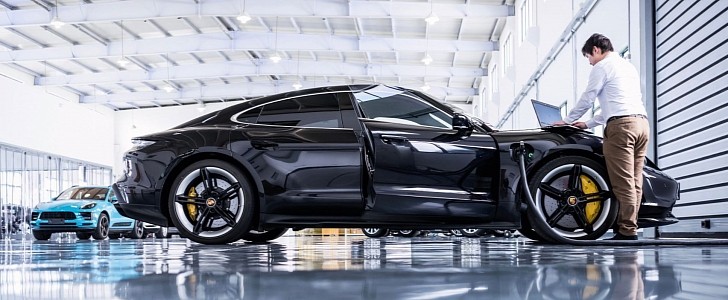Porsche announced last month that it will be working with BASF for developing its much talked-about next generation lithium-ion battery. The recent official announcement adds important details about the future collaboration between the cathode active materials supplier and Cellforce Group, the joint venture between Porsche and Customcells.
It looks like there were several strategic reasons that led Porsche to select BASF as a supplier. First of all, the cathode active materials have high cycle stability and are optimal for fast charging. Plus, according to Markus Graf, Managing Director of the Cellforce Group, BASF will also work on adapting them for next generation silicon anodes.
Secondly, the European locations of BASF’s production plants (one for precursor cathode active materials, in Finland, and one for cathode active materials, in Germany) are essential not only for security of supply, but also for the fast transport. In other words, Cellforce wanted to make sure it can count on constant supplies of European-sourced materials for its next-gen battery, and that they will get to its production plant in the most time- and cost-effective way.
Thirdly, the 2 companies are committed to making the production cycle more sustainable, so they will also cooperate on closing this loop. In order to do that, production waste from the Cellforce Group battery plant will be recycled at BASF’s plant for battery recycling, in Schwarzheide, Germany. This way, materials such as lithium, nickel, cobalt, and manganese, will be able to be re-introduced into the cathode active materials production process.
BASF’s high-energy HED NCM cathode active materials will play an essential part in producing Porsche’s high-performance battery cells, designed to provide a solution for 2 of the main issues with current batteries – energy density and charging speed.
Cellforce Group’s battery production plant is set to begin operations in 3 years from now, with a starting capacity of 100 MWh per year, as a minimum, and expected to grow from there.
Secondly, the European locations of BASF’s production plants (one for precursor cathode active materials, in Finland, and one for cathode active materials, in Germany) are essential not only for security of supply, but also for the fast transport. In other words, Cellforce wanted to make sure it can count on constant supplies of European-sourced materials for its next-gen battery, and that they will get to its production plant in the most time- and cost-effective way.
Thirdly, the 2 companies are committed to making the production cycle more sustainable, so they will also cooperate on closing this loop. In order to do that, production waste from the Cellforce Group battery plant will be recycled at BASF’s plant for battery recycling, in Schwarzheide, Germany. This way, materials such as lithium, nickel, cobalt, and manganese, will be able to be re-introduced into the cathode active materials production process.
BASF’s high-energy HED NCM cathode active materials will play an essential part in producing Porsche’s high-performance battery cells, designed to provide a solution for 2 of the main issues with current batteries – energy density and charging speed.
Cellforce Group’s battery production plant is set to begin operations in 3 years from now, with a starting capacity of 100 MWh per year, as a minimum, and expected to grow from there.







